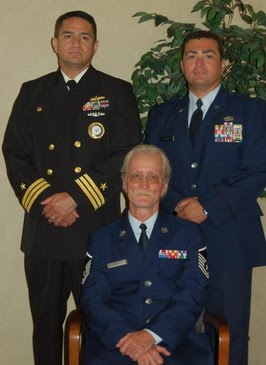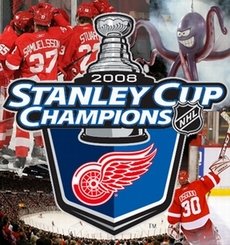From the Usual USAF Source:
That photo makes me nostalgic for a time I didn't live in, mainly for the simplicity and great good looks the uniform had in days gone by. Note the fact these officers had something like 14 ribbons between the three of them and this photo was prolly taken during the last days of WW II, meaning all three gentlemen had LOTS of hours in combat. Any given USAF major today has at least 14 decorations on his/her chest. Think I'm exaggerating? Check out the major's rack on my sidebar.
RIP, Mr. Van Kirk.Last Crew Member of the B-29 Enola Gay Has DiedThe last surviving crew member of the Enola Gay, the B-29 Superfortress that dropped the atomic bomb on Hiroshima, Japan, to accelerate the end of World War II, has died. Theodore Van Kirk died July 28 at a nursing home in Stone Mountain, Ga. He was 93. Van Kirk, known as "Dutch," was the navigator in the Enola Gay crew, led by Col. Paul Tibbets, who commanded the 509th Composite Bomb Group, which was formed to conduct the atomic bomb missions. Flying from an airfield on the captured Japanese Island of Tinian, the crew dropped the 9,000-pound weapon, called "Little Boy," over Hiroshima early on Aug. 6, 1945. Three days later, another B-29 from the 509th dropped a second atomic bomb on Nagasaki. Japan surrendered Aug. 15. The Enola Gay was snarled in controversy in 1994 when the Smithsonian Institution planned to use it in a display that would have depicted the Japanese as victims. A campaign led by Air Force Magazine forced the Smithsonian to cancel that exhibit, and the bomber became a popular attraction at Smithsonian's National Air and Space Museum. Van Kirk always supported the atomic bombings for avoiding an invasion of Japan that could have killed hundreds of thousands of allied troops and Japanese. (See also Atomic Mission from the October 2010 issue of Air Force Magazine.)
Enola Gay crewmembers (l-r) Maj. Theodore Van Kirk, Col. Paul Tibbets Jr., and Maj. Thomas Ferebee. File photo.
That photo makes me nostalgic for a time I didn't live in, mainly for the simplicity and great good looks the uniform had in days gone by. Note the fact these officers had something like 14 ribbons between the three of them and this photo was prolly taken during the last days of WW II, meaning all three gentlemen had LOTS of hours in combat. Any given USAF major today has at least 14 decorations on his/her chest. Think I'm exaggerating? Check out the major's rack on my sidebar.





.jpg)




It seems like it's a lot easier to get decorated today than it was in bygone days.
ReplyDeleteThen again, from some of the reading I've done, it appears there have been more opportunities created.
It's MUCH easier to get decorated today; we've gone on about this subject here at EIP almost since Day One. Virgil's comment, below, is illuminating.
DeleteI'm guessing this all started about the time it was decided not to keep score at kids ball games and not having winners or losers?
DeleteRE: the gap in understanding between todays generations and the WW II generation about dropping the bomb, I remember reading a quote from Tibbets circa 1994 when the Smithsonian controversy was at its height as saying: "I can't even bring myself to talk to anyone under 80 any more."
ReplyDeleteRegarding Awards and Decs, policies ebb and flow. In WW II they were undoubtedly too restrictive--especially the Marines. Also, casualties were often so high that anyone who saw heroic acts in the morning in a position to make a recommendation was often dead by the pm or night. The AAF also awarded, I think, only on the basis of single msn recommendations. In Vietnam, by contrast, an air medal was awarded automatically for every ten msns "North" ("1/10th of an air medal" we used to say after every msn) and a DFC for every 30 north. In-country msns were strictly single msn. In the Gulf Wars, by contrast, they changed it to an Air Medal every 15 msns and it was applied theater-wide. (Hell, they even went back retroactively in the 80s and gave EVERY WW II vet who served in combat a Bronze Star for meritorious service.)
ReplyDelete(more later, gotta jet)
I remember the 1994 debacle all too well. It might look like a tempest in a teapot from today's perspective, but it was a BFD (thank you, Joe Biden) back in the day.
DeleteYou're obviously MUCH more in touch with the practices surrounding Awards & Decs than I am, Virgil. Thanks for that.
It's been awhile, so dunno how current I am, but I will offer one general caveat. At the beginning of any action, medals are handed out relatively profusely and usually one grade higher than deserved in order to build public support. If it goes on long enough (like Vietnam) the Big Kids start to worry about "cheapening" the awards and start down-grading them one level--say from Silver Star to Bronze Star w. V-device. To counter this, submitting commands game the system by submitting one level higher than justified (anticipating the down-grade) in order to get the individual the proper award actually justified...lol, sad but true.
DeleteAn era is ending, at lightspeed.
ReplyDeleteIt most assuredly IS.
DeleteThinking about Paul Tibbets - not many Air Force gents make full bull Colonel before their 30th birthday nowadays, and if they do, they will have more than their fair share of chest candy! Think of what three young Sierra Hotel crew dogs would be sporting in today's medal happy culture. In some ways though, it degrades the value of an award if everyone gets a chestful for any old reason.
ReplyDeleteAlso, I love to read about the WWII submarine drivers who did some jaw-dropping things to earn their medals. Reading the bios and citations for gents like Ramage, Fluckey, and O'Kane, it is ironic that they earn Medals of Honor and multiple Navy Crosses, and then a couple of "I was there" ribbons and the WWII Victory medal.
Young men and women of today thirst to hear the stories of real heroism and valor, and hopefully the stunning tales from our current and recent conflicts will be told with the style and grace that they deserve. It makes my heart ache to think that the current media does not think that the tales of modern day warriors are worth telling to an audience that clearly relates to courage and humility.
An Old Sailor
Well said, Tim. I read a few books about WW II submariners as a child and young man; I was most impressed with what those men went through and I mean all of 'em, not just the captains. As for today, I believe the stories are out there if one takes the time to look for them. You have a point about today's media. Heroics are mentioned in passing more often than not.
DeleteA funny story: Fighter pilots were feeling unloved, so the TAC general decided to give them leather jackets to make them stand out. Then the non-fighter pilots felt left out, so they said OK, all pilots. Then the navigators felt left out, so they said, OK, pilots and navigators. Finally, the flight engineers felt like they were part of the cockpit too, so sure enough, they gave them one also. All this over the course of a couple of years.
ReplyDeleteFinally the loadmasters went on strike, and said they wanted leather jackets too. By then I was an 18 year man, and I needed a leather jacket like I needed a condom. Of course leather jackets were being stolen about every hour, and we'd already had several pilots paying for two or three of them after coming back from a night in Berlin. I never wore my leather jacket outside of duty. I didn't need the aggravation, and I didn't need to advertise that I was a GI. I found things to do in Berlin that didn't involve debauchery and prostitution (the only thing a leather jacket was really needed for).
Great story. I remember reading about USAF bringing back the A-2 a couple o' few years after I retired and I bought one when Avirex made the jackets available to the public sometime around 1990. That thing has served me well and will last me a lifetime.
DeleteI'm part of the vast generation which was generated after the war ended, so of course, I have no memories of the war, only the stories that my elders told me (and it does sometimes seem strange that all of it, the stuff of legends, happened a mere decade-plus before I was born).
ReplyDeleteWhen I was a young pup engineer, back in the 80s, the company I worked for started to seek business from Japanese auto-makers. Our manufacturing processes were heavily centered on metal-stamping. One time, one of the older guys, a WWII vet, was conducting a tour for some Japanese fellows, and he mentioned in passing (with perhaps a tad less 'cultural sensitivity' than might have been desired) that, during the war, our plant had been converted to stamping artillery shells and bomb casings. One of the Japanese fellows, who knew more English than the others, seized on the opportunity to say something like, "Oh, yes. Atomic bomb; very, very bad. Hiroshima. Nagasaki." At which, our guy stiffened just a bit, and looked the guy in the eye, and said, "No Pearl Harbor, no Hiroshima." And the tour continued. . .
...looked the guy in the eye, and said, "No Pearl Harbor, no Hiroshima."
DeleteHeh. I like that, a LOT. Yer Man would prolly be fired for doing something/anything like that today.